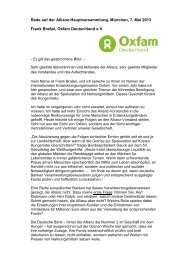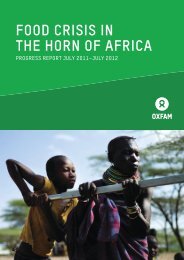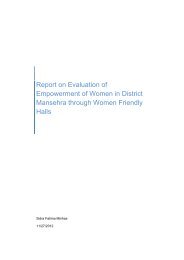shape - Oxfam
shape - Oxfam
shape - Oxfam
Create successful ePaper yourself
Turn your PDF publications into a flip-book with our unique Google optimized e-Paper software.
SHAPE AT MIDLANDS<br />
STATE UNIVERSITY<br />
SHAPE began its HIV work at MSU in late 2004.<br />
MSU is the third-largest state university in Zimbabwe<br />
and is situated in the Midlands provincial capital, Gweru,<br />
232 kilometres south-west of Harare. About 10,300<br />
students attend MSU, with 52% being women.<br />
MSU is well-known in Zimbabwe<br />
for its progressive approach to<br />
gender equality and the high<br />
level of women in leadership<br />
roles, including a female Dean<br />
of Students and a female Student<br />
Executive Council president.<br />
It was because of this strong<br />
stance on gender equality that<br />
SHAPE chose to pilot its Gender,<br />
Masculinities and HIV project<br />
at MSU.<br />
“We felt that it would be much<br />
easier to nurture a group of<br />
visible male gender activists<br />
here at MSU than it would be in<br />
the other universities,” SHAPE’s<br />
MSU Program Manager Leo<br />
Wamwanduka explains. “The<br />
university was already open to<br />
the idea of addressing gender<br />
equality and were more likely<br />
to support our work.”<br />
The project ultimately seeks to<br />
reduce female and male students’<br />
vulnerability to HIV infection by<br />
challenging existing gender role<br />
stereotypes that condone sexual<br />
risk-taking among men while<br />
reinforcing women’s subordinate<br />
status. One of the main ways it<br />
does this is by engaging female<br />
and male students in meaningful<br />
and constructive discussions<br />
around gender issues.<br />
In previous mixed-sex workshops,<br />
SHAPE had observed that<br />
discussions were often polarised<br />
along gender lines. The men<br />
would take a defensive stance,<br />
trivialising women’s concerns and<br />
deliberately making sexist remarks<br />
to upset their female peers.<br />
The women, meanwhile, would<br />
adopt one of two approaches –<br />
the very few energetic ones took<br />
a militant, radical feminist stance<br />
while the majority retreated into<br />
injured silence, opting not to<br />
engage with the men at all.<br />
SHAPE also noted that while<br />
women were constantly targeted<br />
for gender training to improve<br />
their assertiveness, there was<br />
no parallel sensitisation process<br />
for men. As a result, many<br />
young men resisted women’s<br />
empowerment because they<br />
did not understand gender<br />
equality, not because they<br />
were unwilling to change<br />
or share power.<br />
These experiences led SHAPE<br />
to find ways to respond to the<br />
needs of both men and women.<br />
This included creating separate<br />
spaces for the male and female<br />
students to safely and freely<br />
voice their views without feeling<br />
attacked, embarrassed or<br />
violated, and involving both men<br />
and women in gender training.<br />
PREVIOUS PAGE, TOP LEFT: Feedback from<br />
training participants helps SHAPE continuously<br />
improve its activities and workshops. Photo:<br />
Jane Willey/<strong>Oxfam</strong>AUS. TOP RIGHT: SHAPE<br />
Founder and Executive Director Shepstone<br />
Musiyarira. Photo: William Nyamuchengwa/<br />
<strong>Oxfam</strong>AUS. BOTTOM: First and second year<br />
students, from left, Rumbidzai, Willard,<br />
Penellope. Tungamirai and Brighton discuss an<br />
assignment during a study session. Photo:<br />
William Nyamuchengwa/<strong>Oxfam</strong>AUS.<br />
OPPOSITE PAGE, TOP LEFT: SHAPE gender<br />
activist Tafara, a first year information systems<br />
student at MSU, talks about the dangers and<br />
consequences of exhibiting “toxic” behaviours.<br />
TOP RIGHT: SHAPE MSU Program Manager<br />
Leo Wamwanduka talks to a student about<br />
SHAPE’s masculinities workshops. Photos:<br />
William Nyamuchengwa/<strong>Oxfam</strong>AUS.<br />
BEFORE [SHAPE], STUDENTS WOULD<br />
ENGAGE IN SUCH RISKY BEHAVIOUR, IN<br />
GOING TO THE LOCAL [BAR] AND PICKING<br />
UP WOMEN THERE AND SLEEPING WITH<br />
THEM. BUT AFTER SHAPE CREATED THAT<br />
PLATFORM FOR DISCUSSION AND DEBATE,<br />
I HAVE SEEN A HUGE LEAP IN TERMS OF<br />
BEHAVIOUR CHANGE — WHERE STUDENTS<br />
ARE BEGINNING TO BE CAREFUL, THEY<br />
ARE BEGINNING TO USE PROTECTION AND<br />
BEGINNING TO VARY THEMSELVES.”<br />
CORLEN, FOURTH-YEAR STUDENT.<br />
10 11


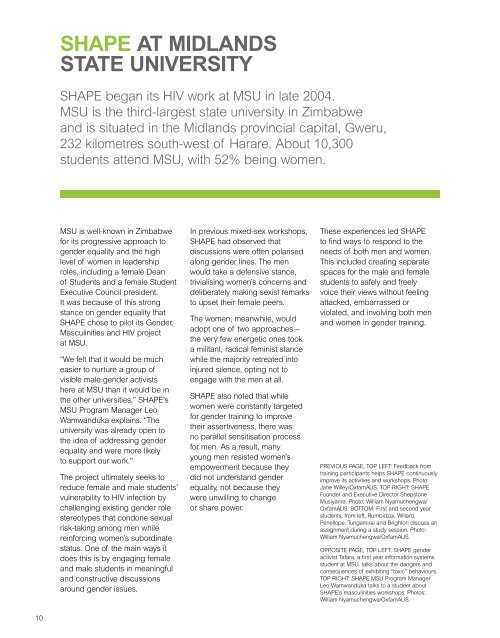


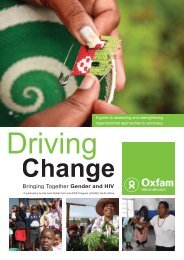
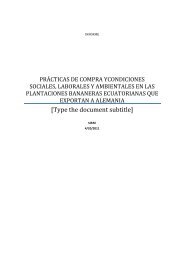
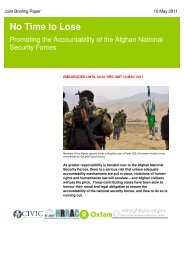
![Download: Faltposter EU-Handelspolitik [PDF 2,17MB] - Germanwatch](https://img.yumpu.com/25095854/1/190x161/download-faltposter-eu-handelspolitik-pdf-217mb-germanwatch.jpg?quality=85)
